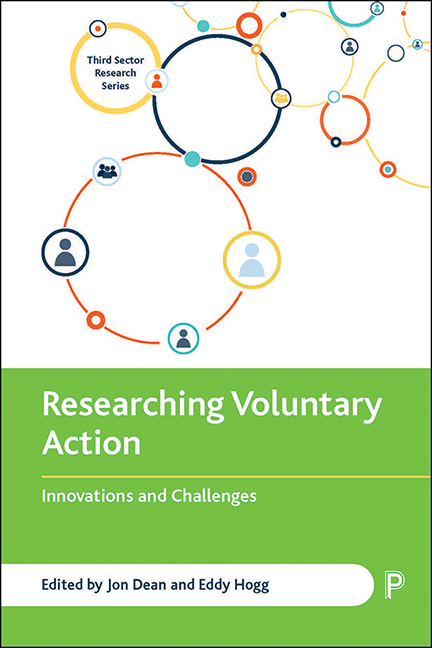Book contents
- Frontmatter
- Contents
- List of figures, tables and boxes
- Notes on contributors
- Acknowledgements
- Series editor’s foreword
- 1 Introduction
- 2 (Un)suitable methods and reflexive considerations: an interview and focus group study of youth volunteering
- 3 Interpretive ethnography: a UK charity shop case study
- 4 Collaborative philanthropy and doing practically relevant, critical research
- 5 Peer research: co-producing research within the context of voluntary and community action
- 6 Charity advertising: visual methods, images and elicitation
- 7 Using archives and objects in voluntary action research
- 8 Using Mass Observation as a source of qualitative secondary data for interdisciplinary longitudinal research on voluntary action
- 9 Investigating meanings and messages on volunteering through television media
- 10 Annual reporting in voluntary organisations: opportunities for content analysis research
- 11 Researching risk in the voluntary sector: the challenges and opportunities of regulatory data
- 12 Exploring the benefits of volunteering: combining survey and administrative data in the Nordic ‘laboratory’
- 13 Spatial approaches to the voluntary sector
- 14 Restudies, surveys and what counts as volunteering
- 15 Conclusion
- References
- Index
3 - Interpretive ethnography: a UK charity shop case study
Published online by Cambridge University Press: 15 September 2022
- Frontmatter
- Contents
- List of figures, tables and boxes
- Notes on contributors
- Acknowledgements
- Series editor’s foreword
- 1 Introduction
- 2 (Un)suitable methods and reflexive considerations: an interview and focus group study of youth volunteering
- 3 Interpretive ethnography: a UK charity shop case study
- 4 Collaborative philanthropy and doing practically relevant, critical research
- 5 Peer research: co-producing research within the context of voluntary and community action
- 6 Charity advertising: visual methods, images and elicitation
- 7 Using archives and objects in voluntary action research
- 8 Using Mass Observation as a source of qualitative secondary data for interdisciplinary longitudinal research on voluntary action
- 9 Investigating meanings and messages on volunteering through television media
- 10 Annual reporting in voluntary organisations: opportunities for content analysis research
- 11 Researching risk in the voluntary sector: the challenges and opportunities of regulatory data
- 12 Exploring the benefits of volunteering: combining survey and administrative data in the Nordic ‘laboratory’
- 13 Spatial approaches to the voluntary sector
- 14 Restudies, surveys and what counts as volunteering
- 15 Conclusion
- References
- Index
Summary
Introduction
Ethnographic research is widely used across social research disciplines examining the voluntary sector, yet the output-and impact-driven culture that directs many research agendas can lead to the value of qualitative modes of inquiry being overlooked. It is helpful therefore for voluntary sector researchers to understand the key uses of ethnography as a qualitative research tool. Drawing on an interpretivist approach, this chapter will outline the utility of ethnography when undertaking a participant observation in two different charity shops. The case study illustrates the importance of immersion within the research setting in terms of recording and analysing ‘natural’ interactions and behaviours. It also explores the issue of access, the role of researcher reflexivity and how micro-level ‘shop floor’ studies of voluntary cultures can serve as a critical measure against data-driven assumptions about contemporary charity work.
To begin, this chapter will provide an overview of ethnography and interpretivism as a methodology, before focusing upon how interpretivist participatory research (and its relational and reflexive aspects) and thick description (Geertz, 1973b) are useful tools to better understand the social world. I will illustrate these with evidence from my own ethnographic study into professionalisation in charity retail operations (Fitton, 2013). In the interest of brevity, this chapter will focus predominantly on the contribution of participant observation and fieldnotes as a valuable method for voluntary sector research. However, semi-structured interviews also formed an important part of this project (see Chapter 2 of this volume for a discussion of the utility of semi-structured interviewing) and ought to be of interest to practitioners or academic researchers considering a multimethod ethnographic approach.
Ethnographic research has its basis within the research paradigm of interpretivism, a qualitative methodology that emerged from the field of anthropology (LeCompte and Schensul, 1999). It works on the premise that all knowledge of reality is created and constantly reinterpreted through social constructions such as culture, systems, language, traditions, shared understandings, tools, documents and so on. Placing emphasis on how a reality is created or constructed negates the idea that there are concrete or objectively measurable facts about any aspect of social life – the voluntary sector included – that are not in some way open to interpretation.
- Type
- Chapter
- Information
- Researching Voluntary ActionInnovations and Challenges, pp. 24 - 35Publisher: Bristol University PressPrint publication year: 2022



